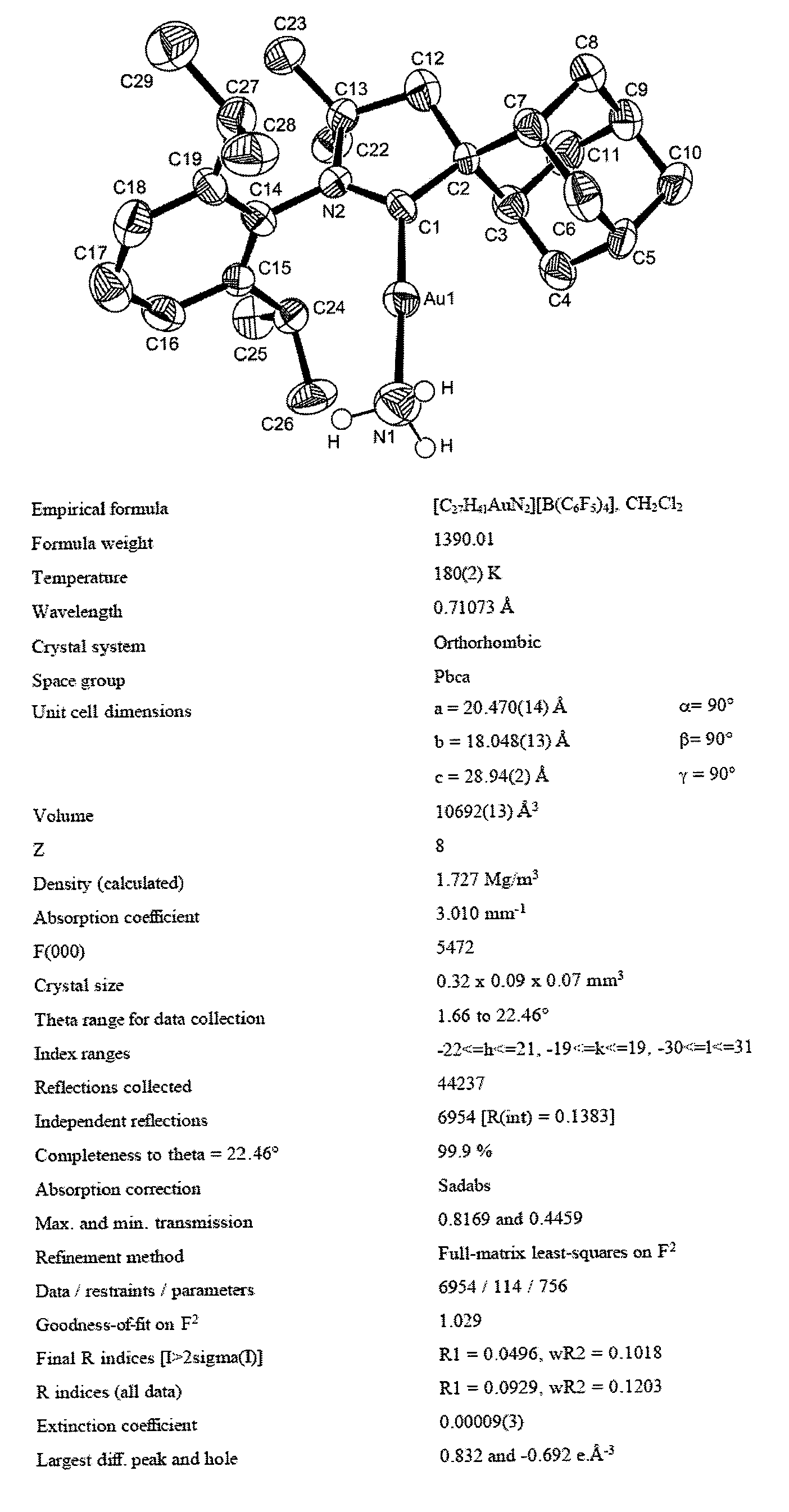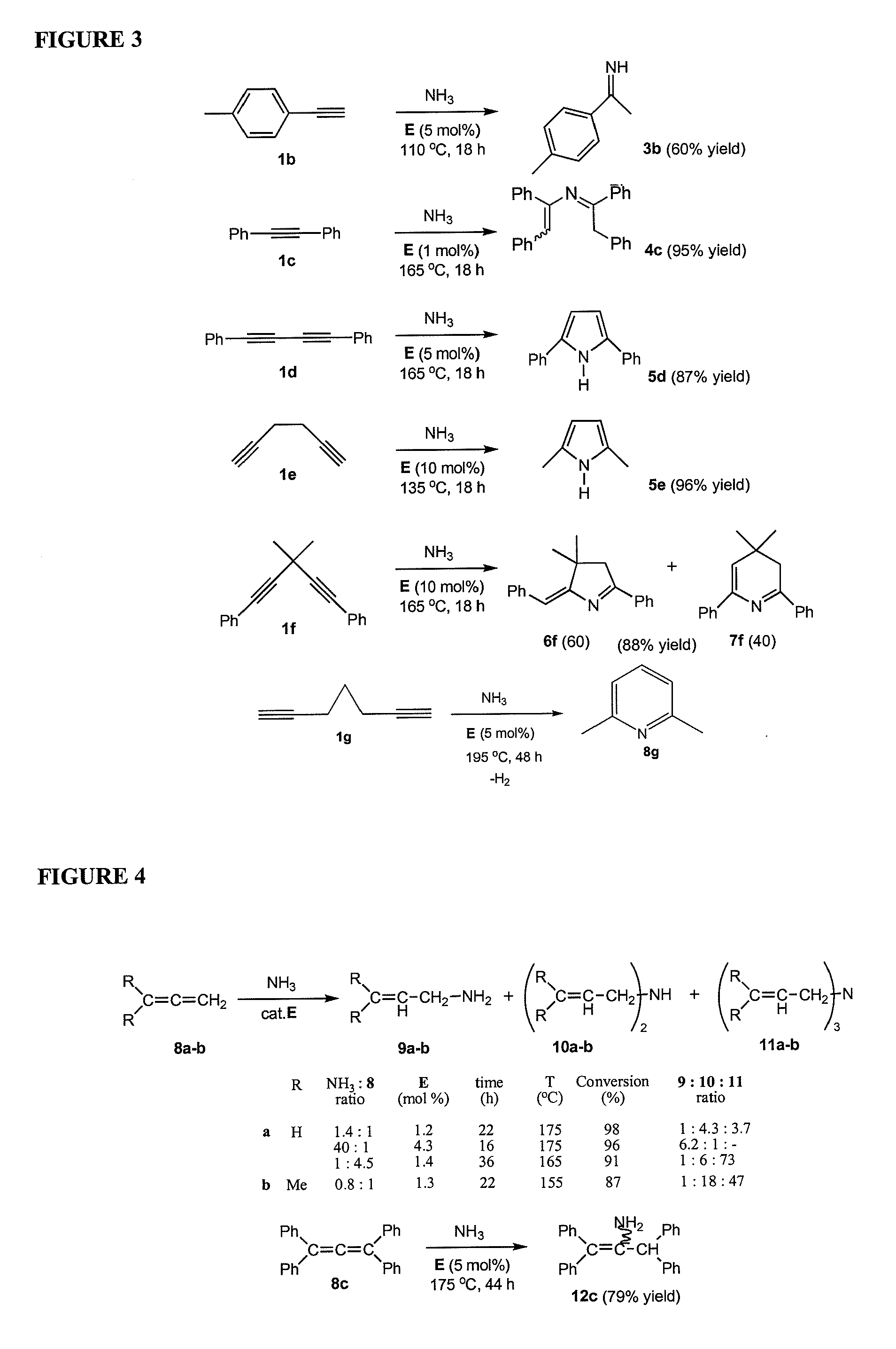Gold catalyzed hydroamination of alkynes and allenes
- Summary
- Abstract
- Description
- Claims
- Application Information
AI Technical Summary
Benefits of technology
Problems solved by technology
Method used
Image
Examples
example 1
Synthesis of Gold Complexes
[0078]Synthesis of Complex D
[0079]One equiv. of 3-hexyne was added to a toluene solution (3 mL) of complex A (1.00 g, 0.743 mmol). The mixture was stirred for 1 min. and hexane (50 mL) was added. The upper portion of the biphasic mixture was removed via canula and the oily residue was dried under high vacuum to afford 0.983 g of complex D as a colorless solid (99% yield). mp: 183-184° C.; 1H NMR (300 MHz, C6D6) δ=0.93 (6H, t, 3J=7.5 Hz, CH2CH3), 1.24 (6H, d, 3J=6.7 Hz, CH(CH3)2), 1.26 (6H, d, 3J=6.7 Hz, CH(CH3)2), 1.37 (6H, s, C(CH3)2), 1.73-1.98 (12H, m), 2.12 (4H, q, 3J=7.5 Hz, CH2CH3), 2.38 (2H, s, CH2), 2.69 (2H, sept., 3J=6.7 Hz, CH(CH3)2), 3.33 (2H, d, 2J=12.7 Hz, CH2), 7.26 (2H, d, J=7.7 Hz), 7.41 (1H, t, J=7.7 Hz); 13C NMR (75 MHz, C6D6) δ=13.7 (CH2CH3), 15.4 (CH2CH3), 23.2, 26.5, 27.3, 28.4, 28.9, 29.5, 34.2 (CH2), 36.5 (CH2), 37.3, 38.8 (CH2), 48.5 (CH2), 65.2 (Cq), 79.9 (NCq), 87.5 (CC), 126.2 (CHm), 131.3 (CHp), 135.9 (m, B(C6F5)4), 135.8 (Ci),...
example 2
Synthesis of a Silver Complex
[0085]
[0086]A Schlenk tube was loaded with adamantyl substituted cyclic alkyl amino carbene (500 mg, 1.32 mmol) and AgCl (190 mg, 1.32 mmol). THF (10 mL) was added and the mixture was stirred for 24 h in the absence of light. Subsequent filtration and concentration of the solution under high vacuum afforded 956 mg of the silver carbene complex (95%); mp: 288° C. (dec.); 1H NMR (300 MHz, CDCl3) δ=1.30 (6H, d, 3J=6.7 Hz, CH(CH3)2), 1.32 (6H, d, 3J=6.7 Hz, CH(CH3)2), 1.36 (6H, s, C(CH3)2), 1.74-2.04 (12H, m), 2.19 (1H, s), 2.25 (1H, s), 2.60 (2H, sept., 3J=6.7 Hz, CH(CH3)2), 3.44 (2H, d, 2J=12.2 Hz, CH2), 7.26 (2H, d, J=7.7 Hz), 7.41 (1H, t, J=7.7 Hz); 13C NMR (75 MHz, CDCl3) δ=22.9, 27.2, 27.5, 27.7, 29.1, 29.7, 34.6 (CH2), 35.5 (d, JC—Ag=2.1 Hz, CH2), 37.3, 38.8 (CH2), 48.0 (d, JC—Ag=6.0 Hz, CH2), 64.6 (d, JC—Ag=12.8 Hz, Cq), 79.5 (d, JC—Ag=12.3 Hz, NCq), 125.2 (CHm), 130.0 (CHp), 135.9 (d, JC—Ag=2.6 Hz, Ci), 145.0 (Co), 262.4 (dd, JC-109Ag=246.5 Hz, JC-1...
example 3
Hydroamination of Allenes and Alkynes with Ammonia
[0087]General Catalytic Procedure: The catalyst (15 mg) and the appropriate amount of alkyne or allene (see main FIG. 2 for mol %) were loaded into a Wilmad QPV thick walled (1.4 mm) NMR tube. C6D6 (0.4 mL) and benzyl methyl ether (5 mg) as an internal standard were added to the mixture. For low catalyst loading (0.1 mol %) experiments, 3 mg of catalyst and 0.1 mL of C6D6 were used. The NMR tube was connected to a high vacuum manifold and excess NH3 (typically 3-6 equivalents) was carefully condensed at −60° C. For experiments with 1,2-propadiene, the allene was first condensed with subsequent addition of NH3. The tube was sealed and placed into an oil bath behind a blast shield, and heated at the specified temperature. ChemDraw® Ultra 10.0 was utilized to name most of the compounds presented in example 3.
[0088]Imine 3a
[0089]Hexan-3-imine was obtained by reacting 3-hexyne with ammonia in the presence of a catalyst (catalysts A, A / A1,...
PUM
| Property | Measurement | Unit |
|---|---|---|
| Temperature | aaaaa | aaaaa |
| Temperature | aaaaa | aaaaa |
| Temperature | aaaaa | aaaaa |
Abstract
Description
Claims
Application Information
 Login to View More
Login to View More - R&D
- Intellectual Property
- Life Sciences
- Materials
- Tech Scout
- Unparalleled Data Quality
- Higher Quality Content
- 60% Fewer Hallucinations
Browse by: Latest US Patents, China's latest patents, Technical Efficacy Thesaurus, Application Domain, Technology Topic, Popular Technical Reports.
© 2025 PatSnap. All rights reserved.Legal|Privacy policy|Modern Slavery Act Transparency Statement|Sitemap|About US| Contact US: help@patsnap.com



